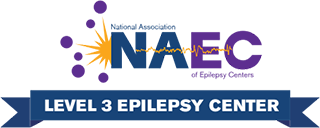leading care at a level 3 epilepsy center
Dayton Children's neurology department is accredited by the National Association of Epilepsy Centers (NAEC) as a level 3 epilepsy center. Level 3 epilepsy centers have the professional expertise and facilities to provide the highest level medical evaluation and treatment for patients with complex epilepsy.
Benefits of a Level 3 Epilepsy Center:
- Broad range of surgical procedures for epilepsy
- Electrocorticography
- Evoked potential recording
- Functional cortial mapping with subdural electrodes
- Intracranial evaluations
- Specialized neuroimaging
- Pediatric epileptologists
- Implantation of vagus nerve stimulatiors
- Resective epilepsy surgery
- Noninvasive evaluation for epilepsy surgery
- Basic neurodiagnostic evaluation
- Basic range of medical, neuro-psychological and psychosocial care
- General neurology
- Hospital emergency department
what is epilepsy?
Epilepsy comes from a Greek word meaning "to hold or seize," and people who have epilepsy have seizures. You might also call a seizure a convulsion, fit or spell. A seizure is a change in a person's behavior that comes from abnormal electrical activity in the brain. Most seizures occur without warning, although some people have a funny feeling, an upset stomach, or a weird smell or taste right before a seizure. Others find that certain things may bring on a seizure, like not getting enough sleep or playing video games.
Depending on where in the brain the seizure is happening, a person's behavior may change in different ways. If too many brain cells are sending signals at the same time, it causes an overload, and a person may pass out and shake all over. People who have epilepsy may have seizures only once in a while or as frequently as every day.
About 3 million Americans have epilepsy, including boys and girls and people of all races and ages. Seizures can start at any age, but often they begin before age 10.
Epilepsy is not contagious - you can't catch it from somebody. Epilepsy is not passed down through families (inherited) in the same way that blue eyes or brown hair are. But if somebody's mom or dad or brother or sister has epilepsy, then he or she has a slightly higher risk for epilepsy than somebody whose family has no history of seizures.
how is epilepsy diagnosed?
Dayton Children's neurology department uses state-of-the-art video electroencephalography (EEG) technology to diagnose the type of seizures a patient is experiencing and determine where seizures are originating in the brain.
Benefits of EEG at Dayton Children's:
- 24/7 Surveillance, an EEG tech monitors your child from a control room on the unit
- Control room on the unit, provides easy access to your child and the care team
- With abnormal readings, the tech and care team are able to quickly discuss with family members
- Real time treatment modifications
- Spacious rooms, added comfort for your child and family
- Superior video capabilities for high-resolution images
If your child has been diagnosed with epilepsy, take a look at our comprehensive guide to epilepsy here.
what does treatment look like for epilepsy?
Whether your child has encountered their first seizure or have been diagnosed with epilepsy, Dayton Children's Epilepsy Center provides a comprehensive approach to help your family understand the treatment options and what might work best for your child.
- First seizure clinic
- Intractable epilepsy clinic
- Psychogenic non-epileptic seizure (PNES) clinic
- Epilepsy surgery
- Ketogenic diet
- Vagus Nerve Stimulator (VNS)

